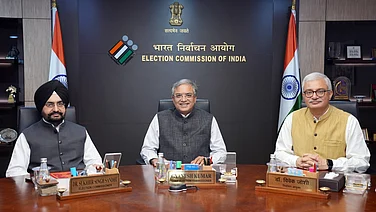Cooperation Minister Amit Shah on Wednesday launched the 'Bharat Organics' brand of newly created National Cooperative Organics Ltd (NCOL) and asserted that it will emerge as the most "trusted" brand in India and abroad in the coming years.
To establish itself as the most trusted brand, the minister said the government will expand the number of labs approved by the National Plant Protection Organization (NPPO) across the country from the existing 34.
Shah also launched the NCOL's logo, website, brochure and NDDB's organic manure. He gave away NCOL membership certificates to five cooperative societies.
Gujarat-headquartered NCOL, with National Dairy Development Board (NDDB) being the chief promoter, was registered under the Multi State Cooperative Societies Act, 2002, on January 25 this year.
Addressing the national symposium on the promotion of organic products through cooperatives here, Shah said, "NCOL is a platform for organic growers. Today, we are launching six products under the 'Bharat Organics' brand and 20 products by December."
The six organic products -- tur dal, chana dal, sugar, rajma, basmati rice, and Sonamasoori rice -- will be sold through Mother Dairy's 150 Safal outlets and online platforms, he said, adding that a network of retail outlets is being created across the country.
Initially, NCOL will sell the organic products in India and later it will market in other countries, he added.
Further, Shah said, about 50 per cent of profits from the sale of organic products through NCOL will be transferred directly to member farmers.
Stressing the need to expand the NPPO-approved labs to certify organic produce, the minister said only 34 labs out of 246 in the country are approved by NPPO.
The government will set up an additional 305 labs -- 100 mobile labs and 205 stationed labs -- in the coming years with the support of food safety regulatory FSSAI and other organisations, he said.
Shah also said: "In the next 10 years, we will be able to see 'Bharat Organics' established as a strong brand in the world market. The cooperative body is framing a long-term strategy in this regard."
NOCL has started a database of natural farming, he said and added that more than 25,000 cooperatives to become members of NOCL by next year, he added.
Sharing the purpose behind setting up NCOL, the minister said the new cooperative body for promoting organic produce was created amid declining land fertility due to the excess use of fertilisers and pesticides. Even people's health is also getting affected due to the consumption of foods produced with high doses of fertilisers and pesticides.
In the journey of becoming self-reliant in foodgrain production by using excess fertilisers and pesticides, some mistakes were committed that are visible now and affecting people's health, he said.
Now that the country is surplus in food production, it is time to reflect on the journey and rectify the mistakes. One solution Prime Minister Narendra Modi called for was natural farming, he added.
Furthermore, the minister said some farm experiments have busted the myth that natural farming lowers crop production. In fact, the experiments have shown improvement in soil health and better yields.
Lakhs of farmers have adopted natural farming in the last 5-6 years and more the adoption the problem for farmers would be marketing and for consumers, it would be getting the certified quality produce, he said.
As rates of organic products are high, many fake organic products are also in the market. NCOL will address both farmers' and consumers' problems, he said.
"In the coming years, Bharat Organics will emerge as the most trusted and big brand in the world. I know the strength of cooperatives and farmers, it will be possible," he added.
The minister said NCOL aims to cover the entire supply chain of organic products through cooperative networks by undertaking various activities like aggregation, certification, production, testing, procurement, storage, processing, branding, packaging, labelling, marketing, etc for the ultimate benefit of farmer members.
Minister of State for Cooperation B L Verma, Cooperation Secretary Gnanesh Kumar, Consumer Affairs Secretary Rohit Kumar Singh, Commerce Secretary Sunil Barthwal, NDDB chairman and NCOL chief Minesh C Shah, and FSSAI CEO G Kamala Vardhana Roa were present at the event.
Organic agriculture is practised in 190 countries on 749 lakh hectares of land and India ranks 4th globally in organic agricultural land and first in number of producers as per 2020 data.
India has 27 lakh hectares of land under certified organic certification, including cultivable and wild harvest areas. The country produced 29 lakh tonnes of certified organic products in 2022-23, as per the official data.
Export of organic produce reached 3,12,000 tonnes in 2022-23, valued at Rs 5,525 crore mainly to the US, EU, Canada and other countries.
Madhya Pradesh, Uttarakhand, Goa, Maharashtra, Gujarat and the northeastern region are some states which are leading in certified organic land.
NCOL is one of the three new cooperatives the government has set up recently. The other two cooperatives work in the field of certified seeds and exports.
There are 7.89 crore cooperative societies across the country with a total membership of 29 crore.
-With PTI Input


























